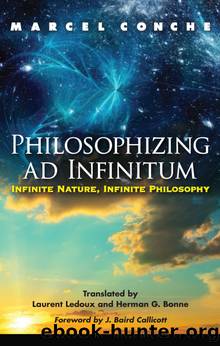Philosophizing Ad Infinitum by Conche Marcel

Author:Conche, Marcel.
Language: eng
Format: epub
Publisher: State University of New York Press
Published: 2014-07-14T16:00:00+00:00
Nietzsche’s Admission of the Infinite Plurality of Worlds
Following his new hypothesis, which, going against the cyclical process, favors chance and places randomness at the heart of reality, Nietzsche can admit the infinite plurality of worlds in the sense of the Epicureans. Added to this is what he calls in The Gay Science “our new infinite.” Because nature is not thought simply by extension, it encompasses the fact that innumerable worlds, which can be called “subjective,” turn inward upon themselves and their interior.
However, Nietzsche hardly reflects on anything but the multiplicity of perspectives that it must be admitted is beyond our own perspective, “our corner”: “I should think that today we are at least far from the ridiculous immodesty that would be involved in decreeing from our corner that perspectives are only permitted from this corner. Rather has the world become ‘infinite’ for us all over again: inasmuch as we cannot reject the possibility that it may include infinite interpretations? Once more we are seized by a great shudder; but who would feel inclined immediately to deify again after the old manner this monster of an unknown world?”42
Nietzsche writes “world,” but it is Nature that is concerned.
Formerly, instead of “Nature,” I used to say simply the “Whole,”43 and I used to distinguish:
1. The Whole (reality in its entirety): It includes everything, but is not a whole, has neither structure nor real unity. Not having unity, it has no meaning;
2. Those beings having life and the vital worlds: Each being lives in his world and not in all the real. This applies to man or flies;
3. The global universe as the whole of material reality: Together, as the Epicureans would wish, it is insurmountably broken up into parts that cannot, even by right, be reassembled: it is the un-combinable;
4. The world of scientific knowledge (for example, the universe of the Big Bang): Science turns the Whole into worlds in function of the variable aspects of the Whole which it investigates;
5. The other human worlds, real, (the world of the aristocracy, that of the farmer, etc.) or imaginary (mythical, religious etc.).
I keep these distinctions; but today I say “Nature” rather than “Whole,” because the Whole is simply thought, while Nature is given.
Download
This site does not store any files on its server. We only index and link to content provided by other sites. Please contact the content providers to delete copyright contents if any and email us, we'll remove relevant links or contents immediately.
| Anthropology | Archaeology |
| Philosophy | Politics & Government |
| Social Sciences | Sociology |
| Women's Studies |
The remains of the day by Kazuo Ishiguro(8962)
Tools of Titans by Timothy Ferriss(8359)
Giovanni's Room by James Baldwin(7313)
The Black Swan by Nassim Nicholas Taleb(7097)
Inner Engineering: A Yogi's Guide to Joy by Sadhguru(6782)
The Way of Zen by Alan W. Watts(6589)
Asking the Right Questions: A Guide to Critical Thinking by M. Neil Browne & Stuart M. Keeley(5751)
The Power of Now: A Guide to Spiritual Enlightenment by Eckhart Tolle(5741)
The Six Wives Of Henry VIII (WOMEN IN HISTORY) by Fraser Antonia(5493)
Astrophysics for People in a Hurry by Neil DeGrasse Tyson(5172)
Housekeeping by Marilynne Robinson(4433)
12 Rules for Life by Jordan B. Peterson(4298)
Double Down (Diary of a Wimpy Kid Book 11) by Jeff Kinney(4257)
The Ethical Slut by Janet W. Hardy(4235)
Skin in the Game by Nassim Nicholas Taleb(4232)
Ikigai by Héctor García & Francesc Miralles(4229)
The Art of Happiness by The Dalai Lama(4118)
Skin in the Game: Hidden Asymmetries in Daily Life by Nassim Nicholas Taleb(3986)
Walking by Henry David Thoreau(3948)
